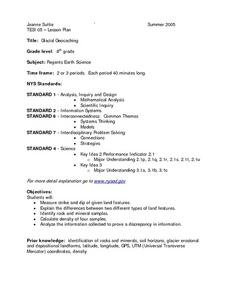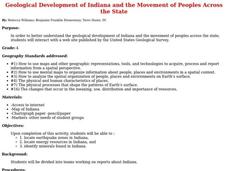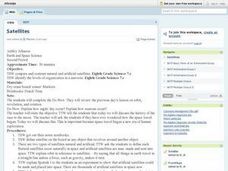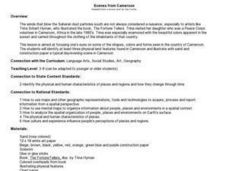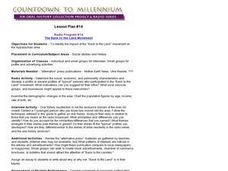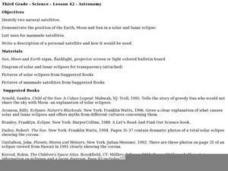Curated OER
Keeping Warm
Young scholars place words describing a range from cold to hot on a scale. Using those words, they identify places on Earth which are cold, hot, freezing or boiling. They practice using and reading a thermometer with three different...
Curated OER
Simple Machines
Fifth graders study how simple machines can help us alter forces and discuss the term mechanical advantage. They then identify dysfunctional simple machines and discuss in groups how the dysfunctions will decrease the effectiveness of each.
Curated OER
What's Making It Look So Brown Outside?
Ninth graders analyze cars and particulate matter in the atmosphere. They analyze results of particulate pollutants and identify which vehicle gives off more particulates. They identify sources of particulate matter and relate to...
Curated OER
Atoms, Kinetic Theory, Solids and Fluids
Students identify and describe the building blocks that make up an atom. They also compare the ages of atoms to the ages of the materials they compose,as well as, give examples that illustrate the small size of atoms.
Curated OER
Water World
Young scholars explore the various steps of the water cycle. They identify the three steps in the water cycle and how they are related. Students describe three ways to conserve water. Young scholars explore the origin of the water...
Curated OER
Dinosaurs
In this earth science worksheet, students match each vocabulary term, that names something specific related to earth science, with its correct description found in the right column. They identify different types of scientists and various...
Curated OER
What's Cookin' at Honey Creek?
Fourth graders are introduced to the process of prehistoric hot rock cooking in earth ovens on the Edwards Plateau of Texas. They explain the steps used in the hot rock cooking process.
Curated OER
Geological Development of Indiana and the Movement of Peoples Across the State
Fourth graders examine the geological development of the state of Indiana. Using the internet, they interact with the United States Geological Survey. They identify earthquake zones and energy resources in the state. They work...
Curated OER
Glacial Geocaching
Eighth graders measure strike and dip of given land features and explain the difference between them. They also look at rock and mineral samples for indentification, along with calculating the density. Finally, information is analyzed...
Curated OER
Particulate Matter in the Air
Students conduct an inquiry exploring the different kinds of particulate matter in the air. They name three different types of particulate matter found in the air and identify different types of solid particulate matter found in the air...
Curated OER
Dreaming of a Healthy City
Ninth graders design a healthy city. They identify the essential elements of a city and describe how climate and geography can determine the layout of a city. They create a blueprint of their design and share in small groups.
Curated OER
Geological Development of Indiana and the Movement of Peoples Across the State
Students are introduced to the geological development of the state of Indiana. Using the internet, they visit the U.S. Geological Survey and locate the earthquake zones in the state. In groups, they locate and identify the energy...
Curated OER
Satellites
Eighth graders explore the history of space travel and satellites. Through a teacher demonstration, 8th graders observe how a satellite revolves another object. They identify natural and artificial satellites, explore how satellites...
Curated OER
Are You Related?
High schoolers study microsatellite markers and explain how they might be used to identify populations. They use data to make inferences about the populations of deep-sea corals.
Curated OER
Getting to the Bottom
Students identify taxa in Arctic benthic communities. They discover organisms that live in these Arctic areas. They analyze data compiled for the Canada Basin Benthic Samples, 2002.
Curated OER
A Flag for Mars
Students investigate the historical use of flags on Earth, debate ownership issues for interplanetary exploration, and design a flag for Mars. The implication of placing a flag at a location forms the focus of the lesson plan.
Curated OER
The Elephant Ate a Banana in the Tundra
Students perform a scene with their small group. They identify an animal, act out what the animal does, where the animal would be found, and what the animal eats. They locate the animal habitats on a map.
Curated OER
What's The Level?
Pupils examine the movement of the water table and saturation zones. They describe the movements of the water table and locate the saturation zones. Students identify the function of each saturation zone. They develop a model of the...
Curated OER
Scenes from Cameroon
Pupils examine art by a Peace Corps volunteer in Cameroon. Using the artwork, they identify three physical land features. They use sand and other materials to create their own day or evening scene in Cameroon. They share their creations...
Curated OER
Radio Program #14-The Back to the Land Movement
Students identify the impact of the "Back to the Land" movement on the Appalachian area. They interview people who have moved back or know someone who has moved back to the Appalachian area. Students graph out profiles of "typical"...
Curated OER
Science - Lesson 42 - Astronomy
Third graders demonstrate the position of the Earth, Moon, and Sun in a solar and lunar eclipse. They list uses for manmade satellites and write a description of how a satellite would be use.
Curated OER
Cloud Shadows
Young scholars classify the visual opacity of various materials, what is needed to create shadows, and classify clouds by the types of shadows that they produce.
Curated OER
Getting to Know the Seven Continents
Students are introduced to basic map and globe skills. Using the internet, they identify and locate the seven continents and complete a blank map to reinforce the names of the continents. They also distinguish between land masses and...
Curated OER
Oregon Rainshadows
Students brainstorm list of possible highest locations in Oregon, identify and label places from list on map using color code, and discuss and identify causes of a rain shadow.










